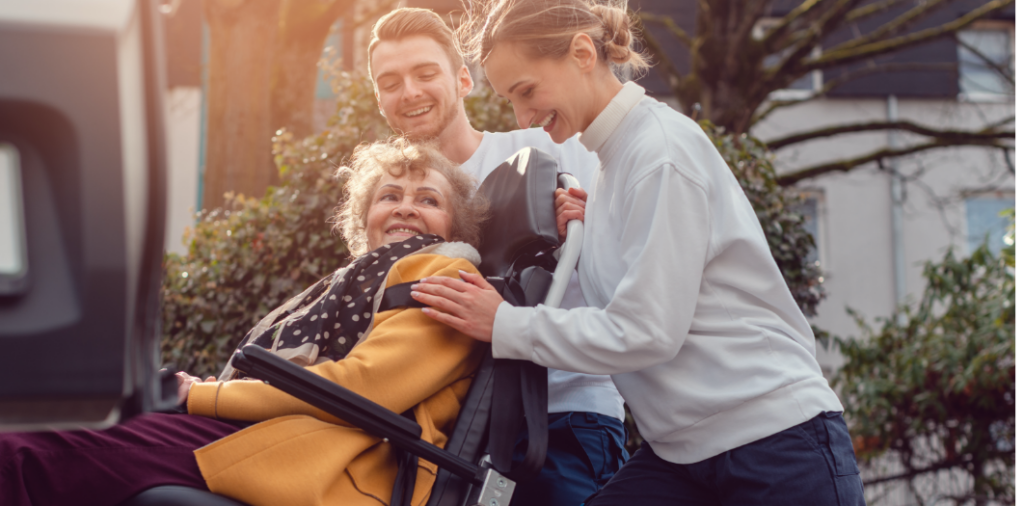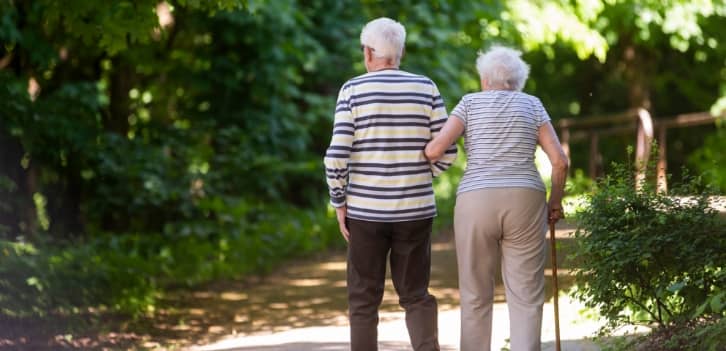

Ageing Well supports older people including people living with dementia through two key programmes:
• @Home
• Dementia
OUR VISION IS TO IMPROVE THE HEALTH AND WELL-BEING OF OLDER PEOPLE, NO MATTER HOW COMPLEX THEIR NEEDS, SO THAT THEY ARE SUPPORTED TO MAINTAIN THEIR INDEPENDENCE AND LIVE A FULFILLING LIFE. WE WILL ACHIEVE THIS BY:

- Improving care and support, ensuring people have more choice and control;
- Improving outcomes and health and well-being;
- Providing coordinated, person centred care and support;
- Making more effective use of resources, skills and expertise.
We know how hard it can be to find help when people need it the most. We want to make sure there is community support to help people stay as healthy as possible so they can carry on doing the things that matter most to them.
The development of integrated services for older people with complex needs and long term conditions, including dementia, is one of the key priorities of the Cardiff and Vale of Glamorgan Regional Partnership Board.

@Home
This programme will expand ‘Get Me Home’ and deliver a package of support to help people keep and regain independence. The services will help people live in their homes and communities for as long as possible, for instance Health and Wellbeing Centres will be able to help people stay well through community classes and practical support like nail cutting.
Dementia
We will continue our work supporting people with dementia and their carers.
Engagement
Supporting people to influence our work and decisions.

What we’ve achieved
Signposting and Crisis Response
Cardiff, Vale of Glamorgan
A single point of contact for residents in the Vale of Glamorgan that can deal directly with requests for information and advice about Adult Social Care Services and other related services.
Contact 1 Vale
West Cardiff
A single point of contact for residents in the Vale of Glamorgan that can deal directly with requests for information and advice about Adult Social Care Services and other related services.
Cardiff Independent Living Service
Cardiff
Cardiff Independent Living Services helps people access a wide range of support to help them live as independently as possible.
Accelerated Cluster Model & Social Prescribing
West Cardiff
One of our Transformation Fund projects has allowed a group of GP practices in the South West Cluster in Cardiff to develop new ways of working.
Supporting people with dementia
The development of integrated services for older people with complex needs and long-term conditions, including dementia, is one of our key priorities.
Our Priorities

DECHRAU’N DDA
STARTING WELL
We want every child in Cardiff and Vale to have the opportunity to thrive. Our work focuses on children in vulnerable situations and the services that support them.

HENEIDDIO’N DDA
AGEING WELL
We know how hard it can be to find help when people need it the most. We want to make sure there is community support to help people stay as healthy as possible so they can carry on doing the things that matter most to them.

BYW’N DDA
LIVING WELL
As a Partnership we have worked together with people with a learning disability, their families, carers and the third and independent sector to produce a clear direction for the planning and delivery of adult learning disability services across the region over the next five years.
Case Studies
Alison Law
Improvement and Development Manager, Joint Commissioning
- Project management across the partnership to enable the alignment and joint commissioning of services, which includes shaping the market, regional commissioning strategies, contracting and quality assurance.
- Programme manager for ICF Capital fund
Whilst delivery was hampered by COVID-19, work continued to improved outcomes for local citizens:
GPs referred 277 patients through the social prescribing platform (alternative to traditional approaches) for assistance and support.
Community-based, multi-disciplinary teams discussed 231 individual patients.
4,740 patients were contacted to offer support and signposting.
Intermediate Care
Both ICF and Transformation Funds support a range of intermediate care services that provide citizens with the care they require as close to their own home as possible. Local citizens can be admitted from home
(step-up), or from one of the larger hospitals (step down).

How Get Me Home helps patients return home safely
Get Me Home
Hear how integrated support is delivered across projects funded by the ICF and Transformation Fund
to get people home. Together, the projects work with an overarching aim of collaboration for improving the patient journey and providing integrated support to meet the needs of the individual. Making their transition from clinical care, through rehabilitation
to independent living.
The projects include:
A single point of contact within the hospital for discharge and community-based services, removing duplication and inconsistency,
and improving co-ordination and information sharing.
Age Connect Discharge Liaison Officers for Vale citizens and their families. Both teams use ‘What Matters’ conversations to trigger holistic, tailored support that meets the wellbeing needs of the individual, providing preventative interventions
and supporting independent living.
- Additional Community Resource Team support with funding for Physiotherapists, Occupational Therapists, Social Workers, Social Work Assistance, Third Sector Co-ordinators and domiciliary care support for step up and step-down care.
- A single point of contact within the hospital for discharge and community-based services, removing duplication and inconsistency,
- and improving co-ordination and information sharing.


Video: Get Me Home: Pink Army
Get Me Home Plus
The Get Me Home Plus care model helps people in hospitals who have been assessed as needing higher level support to get the care they to return home. Being at home helps people recover faster as people feel more comfortable and are able to move around more easily and be in a familiar environment with their friends and families.
Find out more about how integrated support is delivered
COVID-19 meant we haven’t been able to collect
all the data we wanted to, but the project.
- Reduced need for social care packages
- Reduced length of stay
- Improved communication between different services
- Fast discharge from hospital and no delayed discharge
service user
“… they supported me whilst I waited for a room in a care home where I now have what I need – electric chair/bed.
And now I can maintain my independence.”
Occupational Therapist
“… has been great providing to patients on the ward to support safe discharges. There is improved communication on the ward between health staff and social services in regards to waiting
on information around package of care and communication to
social workers.”
Accommodation Solutions
We have continued to support 12 flats for the short-term use of local citizens to assist with hospital discharge or prevent admission.
Whilst the team received a lower number of referrals than normal due to COVID-19, they were still able assist 142 people in their discharge from hospital at an estimated saving of £380,485.
Supporting people with dementia

Dementia care
The development of integrated services for older people with complex needs and long-term conditions, including dementia,
is one of our key priorities. Our vision is to improve the health and well-being of older people, no matter how complex their needs, so that they are supported to maintain their independence and live a fulfilling life.
Through support from the Welsh Government Integrated Care Fund, the RPB was able to support initiatives guided by the Cardiff and Vale Draft Dementia Strategy 2017-2027 that see health and social care services working together to support older people with dementia. So that our actions could make a clear difference at a local level, we engaged with representatives from Cardiff and Vale University Health Board, Cardiff Council, Vale Council, and the Alzheimer’s Society, along with a person living with dementia and a person with experience of caring
for a person with dementia.
Dementia Friendly Communities
The development of integrated services for older people with complex needs and long-term conditions, including dementia, is one of our key priorities. Our vision is to improve the health and well-being of older people, no matter how complex their needs, so that they are supported to maintain their independence and live a fulfilling life.
Through support from the Welsh Government Integrated Care Fund, the RPB was able to support initiatives guided by the Cardiff and Vale Draft Dementia Strategy 2017-2027 that see health and social care services working together to support older people with dementia. So that our actions could make a clear difference at a local level, we engaged with representatives from Cardiff and Vale University Health Board, Cardiff Council, Vale Council, and the Alzheimer’s Society, along with a person living with dementia and a person with experience of caring for a person with dementia.

The Dementia Friendly team at Constantinou Hair & Beauty, Cardiff
Dementia Friendly Communities’ is a programme developed by the Alzheimer’s Society which facilitates the creation of dementia friendly communities across the UK. The programme aims to engage organisations, local businesses, front-line staff and members of the public to share the responsibility for ensuring people with dementia feel understood, valued and able to contribute to their communities.
“We have been blown away by the support and education from Ingrid *💗 We are proud to now be a Dementia Friend and will continue to learn and develop our understanding of Dementia. If you know any local businesses who would benefit from this training, we can highly recommend it.”
Helen Rouse – Director of O. Constantinou & Sons (Hair and Beauty Salon) in Cardiff pledged to become a dementia friendly business in July 2020 (*Ingrid Patterson – Dementia Friendly Communities Coordinator for Cardiff and Vale of Glamorgan)
In collaboration with Marie Curie volunteers, the RPB has facilitated dementia friends training across Cardiff and the Vale of Glamorgan with a view to becoming a Dementia Friendly Region. There are now over 7,000 dementia friends. In early 2020 a Dementia Friendly business pilot was launched. Independent hair and beauty salon O Constantinou & Sons in Cardiff were
the first to successfully pledge to become a Dementia Friendly business.
Subsequently, nine organisations pledged to become
Dementia Friendly during 2020 – 2021.
Dementia-friendly communities newssheet Feb 21 Welsh
Dementia-friendly communities newssheet Feb 21
Dementia Friendly communities newssheet April 2021
Dementia Learning & Development Team
The development of integrated services for older people with complex needs and long-term conditions, including dementia, is one of our key priorities.
Our vision is to improve the health and
well-being of older people, no matter
how complex their needs, so that they
are supported to maintain their independence and live a fulfilling life.
Through support from the Welsh Government Integrated Care Fund, the RPB was able to support initiatives guided by the Cardiff and Vale Draft Dementia Strategy 2017-2027 that see health and social care services working together to support older people with dementia. So that our actions could make a clear difference at a local level, we engaged with representatives from Cardiff and Vale University Health Board, Cardiff Council, Vale Council, and the Alzheimer’s Society, along with a person living with dementia and a person with experience of caring for
a person with dementia.
Partnership working to Support those living with dementia
Funding was used for a Positive Approaches to Care (PAC) certified, Dementia Care training team to train colleagues in primary care who review patients in their local area to achieve the competencies outlined within the Good Work Framework for Wales. This has resulted in improved rates of dementia diagnosis in Cardiff and the Vale. but more than that, has provided a safer environment, closer to home that many vulnerable patients will benefit from when being diagnosed with a life-changing condition. The feedback from patients reviewed in the GP clinics has been resoundingly positive.
In addition, funding has also enabled the Dementia Learning and Development Team in Cardiff to develop the role of the memory link worker. These individuals have come from various backgrounds in health and social care. They work within different localities within Cardiff and the Vale as per GP practice, helping them to develop close working relationships with GP’s, local services and allied health care professionals. The memory link workers have been integral to our operations as a memory team over the past few years in acting as a link or connector for patients to help them navigate the healthcare system and ensure patients are referred to the right person at the right time to address their needs.
Thanks to funding provided by Welsh Government a collaboration led Dr Cherry Shute, Locum Consultant Geriatrician within the Memory Team at Llandough Hospital and Dr Keziah Maizey a GP with a specialist interest in memory based at Llandaff North Medical Centre to develop and deliver a unique and pioneering system to improve the experiences of those living with dementia and their loved ones.
How the funding was used:
- Training eight General Practitioners to develop a specialist interest in memory
- Building capacity in local clinics to review circa 700 patients per annum
- Recruiting eight memory link workers, to work closely between primary and secondary care services making an average 5400 contacts with patients a year. Reducing burden on already stretched primary care services and the risk of crisis admissions
- 110 staff received skills training Funding occupational, speech and language therapists and dieticians with cognition interest within the Community Resource Team in Cardiff and the Vale Community Resource Service.
- Funding occupational, speech and language therapists and dieticians with cognition interest within the Community Resource Team in Cardiff and the Vale Community Resource Service.
GP comment,
“I constantly receive positive verbal feedback from patients and their carers about the benefits of having memory clinics in GP practices. They find it less intimidating, more accessible for those with disabilities”.
“One of the best training sessions I have attended, it helped
me think about what the person living with dementia is experiencing”.
In parallel, the dementia care mapping (DCM) activity of the team provides an evidenced-based approach to collecting information on the lived experience of dementia. The information is then shared with others to encourage critical reflection on practice, and to develop and improve person centred care across the workforce.





